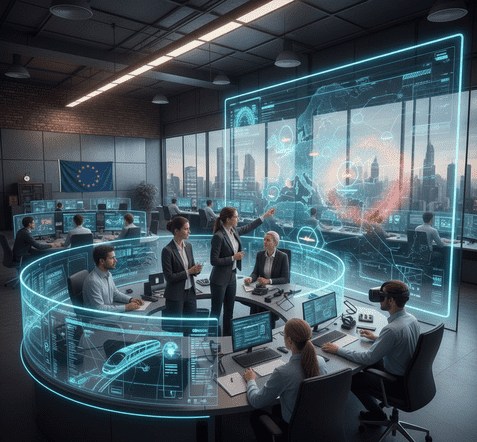Robot Lawyers on the Rise: When AI Becomes the New Law Firm
Introduction
Around 58 percent of corporate legal departments now expect to rely less on outside law firms thanks to generative AI. And 77 percent of professionals foresee AI having a transformational impact on their work within five years. (Source)
These compelling figures underline a pivotal shift: the era where AI takes on core legal work. As they begin to become an AI legal expert, lawyers and organizations alike must embrace the imperative to learn AI law and compliance. It is best to begin the journey with structured programs like an AI legal regulations course.
This blog explores how “robot lawyers” are reshaping the profession, the learning opportunities they bring for individuals and firms, and what this means for the job market.
Buckle up! It’s a curiosity‑evoking ride into the future of law.
The Emergence of AI‑Powered Law Firms
Bloomberg Law recently reported that AI‑powered law firms are pushing boundaries over who can deliver legal advice as more advanced AI tools take on traditionally human tasks. In tandem, firms are rapidly scaling AI use: AI is now part of everyday workflows, from document drafting to client analytics. (Source)
Yet, while innovation surges, skepticism remains. One insightful report reveals that while AI tools are increasingly accurate, lawyers are still essential as supervisors. The unfolding reality? AI excels at routine tasks—but enforcement of quality, ethical judgment, and nuance remains distinctly human domains. (Source)
What Professionals and Organizations can Learn from this?
Individual Learning
For legal professionals, the rise of AI offers rich opportunities to become an AI legal expert. Building expertise in AI ethics, prompt engineering, and regulatory compliance is critical. Law students, for example, could benefit from partnerships with computer science departments to gain hands‑on exposure to generative models, hallucination mitigation, and legal prompt design.
Organizational Learning
Firms are evolving, too. Some, like DLA Piper, are stress‑testing their AI systems, combining attorney and tech expertise to ensure models align with legal standards. A&O Shearman, working with AI provider Harvey, is deploying tools to reduce manual labour for senior lawyers while emphasizing redeployment, not layoffs. This highlights a crucial lesson: embrace innovation deliberately, with ethical guardrails.
Moreover, legal institutions in the UK and beyond are offering AI training and insisting on human oversight in AI‑assisted work. These initiatives underscore the need for structured learning in AI law that includes a solid AI legal regulations course.
How does it impact the Job Market?
Automation of Routine Roles
Technologies like Harvey, Hebbia, and other AI systems are now assisting with document analysis, contract review, due diligence, and legal research. LLMs have even been shown to outperform humans in complex invoice review tasks, achieving up to 92 percent accuracy, completing reviews in 3.6 seconds versus minutes, and slashing costs by 99.97 percent.
Deloitte estimated that over 110,000 law jobs in the UK might vanish within two decades due to legal automation, with 22–35 percent of law/paralegal work already automatable in the US. (Source)
Evolving Legal Roles
AI isn’t here to replace lawyers entirely, far from it. Scholars argue that as LLMs mature, lawyers will be needed for many tasks. These include the ones requiring judgment, empathy, and ethical reasoning, developing precedent, navigating complex societal trade‑offs, and other non‑routine responsibilities. This growing complexity means legal professionals must learn to become AI legal experts so they can understand how AI decisions intersect with ethics and law.
Pressure on Traditional Business Models
AI is also shaking up how law firms charge for services. The traditional billable‑hour model, once sacred, is under threat, as AI boosts efficiency and ushers in flat‑fee models or alternative pricing structures. Firms that fail to adapt may fall behind.
Key Lessons: What We Learn from This Revolution
| Lesson | Description |
| Embrace continuous learning | Legal professionals must proactively learn AI law and compliance to stay relevant. |
| Forge interdisciplinary collaboration | Firms must blend legal, tech, and ethical expertise to safely implement AI systems. |
| Design future‑proof roles | Anticipate evolving tasks—strategic, high‑judgment roles will mix with AI‑enabled workflows. |
| Reimagine business models | AI challenges the billable‑hour norm; firms must innovate pricing and service delivery. |
| Elevate ethical standards | Ensuring fairness, transparency, and human oversight is non‑negotiable. |
What You Can Do Today
- For professionals: Start mastering AI‑legal intersections, take courses, join AI ethics communities, experiment with AI tools, and steer your career toward high‑value work.
- For organizations: Invest in AI training, governance, red‑teaming, and ethical practices. Your competitive advantage lies in safe, smart innovation.
- For legal educators: Integrate AI in curricula, from AI legal regulations course modules to cross‑disciplinary training in compliance and tech fluency.
Final Word
The rise of robot lawyers brings both disruption and opportunity. It compels legal professionals and firms to become an AI legal expert. They can begin their journey by enrolling in an AI legal regulations course and committing to lifelong learning. They will get access to a structured curriculum to learn AI law and compliance with precision and ethical clarity.
If you are a forward‑thinking lawyer or an organizational leader, all signs point to one strategic move: pursue an AI Legal certification. Armed with this credential, you will master the rules, responsibilities, and power of AI in legal practice. This way, you can be a trusted advisor, innovator, and future‑ready leader the industry needs.
Embrace the shift. The future of law is robotic, intelligent, and it needs you to shape it with knowledge.
Recent Blogs

FEATURED
EU’s Cyber-Rail Hands-On Training Is a New Model for Sector-Targeted AI Partners
February 14, 2026
FEATURED
Per Scholas Job Placement Success Shows Certified Training Can Drive Real Outcomes
February 14, 2026
FEATURED
Why U.S. Organizations Are Struggling to Train Entry-Level Workers on AI and How Partnerships Fix It
February 14, 2026
FEATURED
New Federal AI Skills Tax Credit Could Make Enterprise Training Partnerships Irresistible
February 14, 2026
FEATURED
How AI Training Data Deals (Like Robo.ai’s) Highlight New Workforce Needs
February 13, 2026

